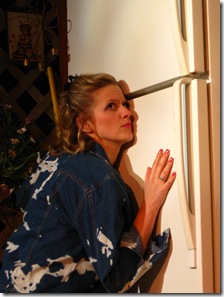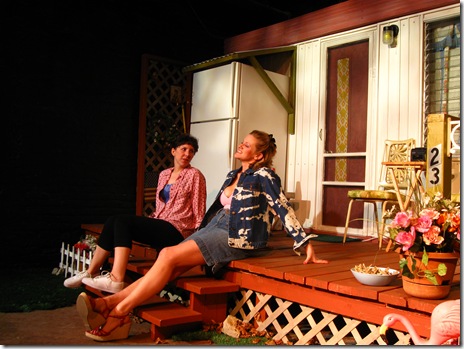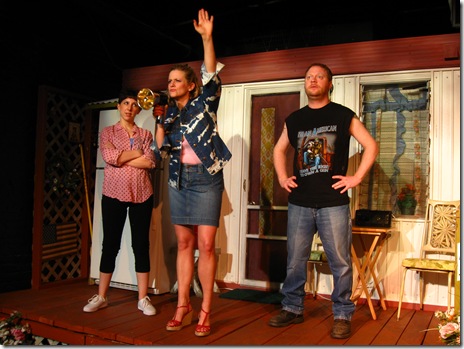Faith among the
desperate
Greenhouse Theater Center, 2257 N. Lincoln(map)
through April 17th (more info)
| |
| |
| |
The fervid religiosity of the American South suffers so much parody and lampoon it’s a wonder to find any comedy based on it that won’t bog down in cliché and 2-dimensional stereotype. But playwright John Culbertson shows a real feel for his subject. With Messiah on the Frigidaire, he demonstrates enough quick-witted familiarity to zing the zaniness of belief, while compassionately allowing his

characters the room to doubt, despair, and grow. Hubris Productions opens its fourth season at Greenhouse Theater Center with this gentle and astute play. Director Dennis Frymire and cast zealously realize its delicate balance between the hilarity of flamboyant religious showmanship and the loneliness of true dark nights of the soul.
Chief among lost souls is Lou Ann Hightower (Kim Boler)–facing a series of dead ends in her marriage, her blue-collar life, and her church. That might just look like tough times on anyone else. However, Lou Ann is also losing her faith, which for her is like slowly being drained of life’s blood. Luckily, she has a comforting sounding board in her friend and next-door neighbor, Betsy Gridley (Laura Rauh), the happily married ex-slut of Elroy, South Carolina. Lou Ann can confide to Betsy about the estrangement between her and her husband, Dwayne (Aaron Sjoholm), which has occurred under the strain of going nowhere fast. Betsy can still find joy in the streetlights as they come on in the evening, but Lou Ann finds her dreams and Dwayne’s suffocating in the confines of the trailer park.
Yet the Lord works in mysterious and/or obvious ways. In a premature attempt at topiary sculpture, another neighbor’s child has hacked away at one of Lou Ann’s trees. Light from the street lamps projects through its jagged branches, casting a shadow upon the Frigidaire on Lou Ann’s front porch, revealing–the face of Jesus! (Or Willie Nelson, take your choice.) Always thinking, husband Dwayne immediately perceives the monetary value of generating crowds to come view the new icon.
The trouble is, everyone else in town sees the monetary value, too—from the Reverend Hodges (Jeff McVann), who tells Lou Ann she doesn’t “fit in” to his church, to Elroy’s bank president Larry Williamson (Jack Birdwell) who denied Dwayne the loan to open a video store, but set up his own cousin with Dwayne’s idea. Culbertson is quite smart in the the numorous ways he highlights Elroy’s class dynamics. But he is also very conscious about the way it wreaks havoc with Lou Ann’s delicate conscience. Lou Ann may be more Christian than the church she’s been thrown out of or even the believers that show up on her property, but that doesn’t necessarily make her any happier.

Frymire maintains the possibility of hope by snuggly weaving the relationships between Lou Ann and Betsy, and Lou Ann and Dwayne. Boler’s performance quietly, profoundly reaches to the solitary longing in Lou Ann’s soul but it also exposes Lou Ann’s simple, open acceptance of other people in their beliefs, no matter how wacky. Sjoholm’s Dwayne is a wily but frustrated good guy—chomping at the bit to make good on his dreams; only needing someone, especially Lou Ann, to believe in him. As Betsy, Rauh never goes overboard with the fun and friendly sluttiness—just enough to make her casual and comfortable in her own skin, never enough to overwhelm the friendship between Betsy and Lou Ann.
Even the “bad guys” get a bit of sympathy in their interpretation. Reverend Hodges may be the douchiest of douche bag preachers, but McVann’s performance also gives the impression that he is almost always on the point of obsequiously apologizing to someone. Birdwell portrays Larry Williamson with light, Southern college boy charm, masking the teeth he has underneath just long enough before he needs them.
This is one of those productions where the set should really live up to the quality of the storytelling. John Whittington makes the most of the cramped studio space available, but it still shows a flat, 2-dimensional quality. That might be fine if these were comic book characters—but they are not and the acting is not. Humane portrayals of flawed, human characters deserve humane, if not royal surroundings.
★★★½
| |
| Rating: |
| |

